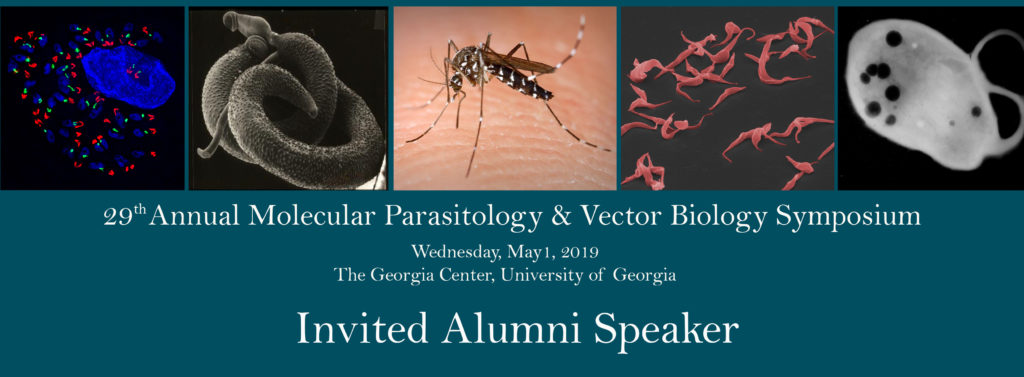Invited Speaker Spotlight: Matthew Collins

About the Speaker
 Matthew Collins obtained his Ph.D. studying under mentor Dr. Rick Tarleton at the University of Georgia; his thesis project focused on the role of CD8+ T cells in controlling chronic T. cruzi in nonlymphoid tissue. During Infectious Diseases fellowship at the University of North Carolina, he worked with Dr. Aravinda de Silva to study specificity and cross-reactivity of human antibody responses to flaviviruses such as dengue and Zika virus. He is now an Assistant Professor at Emory University where he leads a translational arbovirology research program. Goals of the group are to understand basic aspects of human adaptive immune responses to sequential related viral infection and to develop and implement serologic tools to support epidemiologic studies and the development of vaccines and diagnostic tests.
Matthew Collins obtained his Ph.D. studying under mentor Dr. Rick Tarleton at the University of Georgia; his thesis project focused on the role of CD8+ T cells in controlling chronic T. cruzi in nonlymphoid tissue. During Infectious Diseases fellowship at the University of North Carolina, he worked with Dr. Aravinda de Silva to study specificity and cross-reactivity of human antibody responses to flaviviruses such as dengue and Zika virus. He is now an Assistant Professor at Emory University where he leads a translational arbovirology research program. Goals of the group are to understand basic aspects of human adaptive immune responses to sequential related viral infection and to develop and implement serologic tools to support epidemiologic studies and the development of vaccines and diagnostic tests.
Matt Collins’s Talk
Dr. Collins will present the following talk at 9:55 am.
Epitope Targets of the Human Antibody Response to Zika Virus Infection
Matthew H. Collins1,2, Huy A. Tu3,4, Ciara Gimblet-Ochieng5, Guei-Jiun Alice Liou5, Ramesh S. Jadi5, Stefan W. Metz5, Ashlie Thomas5, Benjamin D. McElvany4, Edgar Davidson6, Benjamin J. Doranz6, Yaoska Reyes7, Natalie M. Bowman2, Sylvia Becker-Dreps8, Filemón Bucardo7, Helen M. Lazear5, Sean A. Diehl3,4, Aravinda M. de Silva5
1Department of Medicine, Emory University 2Department of Medicine, University of North Carolina-Chapel Hill 3Cellular, Molecular, and Biomedical Sciences Program, University of Vermont 4Department of Microbiology and Molecular Genetics, University of Vermont 5Department of Microbiology and Immunology, University of North Carolina 6Integral Molecular, Inc. 7Department of Microbiology, National Autonomous University of Nicaragua 8Departments of Family Medicine and Epidemiology, University of North Carolina-Chapel Hill
Zika virus (ZIKV) transmission became a global public health emergency after the recent epidemic in Latin America and beyond revealed rare but dire manifestations of infection such as severe birth defects and Guillain-Barré syndrome. The emergence of ZIKV in areas where other related flaviviruses such as dengue are endemic creates challenges in accurately diagnosing infections, conducting reliable surveillance, as well as in understanding the distinguishing aspects of the host immune response to ZIKV due to antibody (Ab) cross-reactivity. Because vaccines represent a key strategy for prevention of infectious diseases and typically rely on robust antibody responses, we sought to analyze the durable antibody responses in individuals infected by ZIKV as a first flavivirus infection. We observed complex populations of antibodies that bind to epitopes on intact virions, simpler epitopes on envelope protein monomers as well as envelope subdomains. Moreover, strong neutralizing antibody responses that minimally cross-react with dengue viruses were consistently detected. To better understand the molecular determinants of the neutralizing antibody response to ZIKV and to develop tools that could aid vaccine development, we isolated two potently neutralizing monoclonal antibodies (mAbs) from one primary ZIKV case and mapped key amino acid residues involved in mAb binding and neutralization by multiple complimentary methods including generation of neutralization escape mutants and alanine scanning mutagenesis. The mAbs recognize different epitopes centered on domain I and domain II of the viral envelope protein. Functionally, both mAbs were protective in a lethal mouse model of ZIKV infection. Ongoing work is examining the prevalence of these specific Ab responses at the population level. This work provides new knowledge and tools that may be useful as diagnostic reagents or as therapeutics and will advance vaccine development.
More information about the Molecular Parasitology & Vector Biology Symposium and the schedule of presentions are available on our website. The deadline to register for the symposium is April 24.
